The relationship between Buddhism and sexual orientation varies by tradition and teacher. According to some scholars, early Buddhism appears to have placed no special stigma on homosexual relations, since the subject was not mentioned.

A bhikkhu is an ordained male in Buddhist monasticism. Male and female monastics are members of the Sangha.
Buddhist socialism is a political ideology which advocates socialism based on the principles of Buddhism. Both Buddhism and socialism seek to provide an end to suffering by analyzing its conditions and removing its main causes through praxis. Both also seek to provide a transformation of personal consciousness to bring an end to human alienation and selfishness.

Sulak Sivaraksa is a Thai social activist, professor, writer and the founder and director of the Thai NGO "Sathirakoses-Nagapradeepa Foundation", named after two authorities on Thai culture, Sathirakoses and Nagapradeepa. He initiated a number of social, humanitarian, ecological and spiritual movements and organizations in Thailand, such as the College SEM.
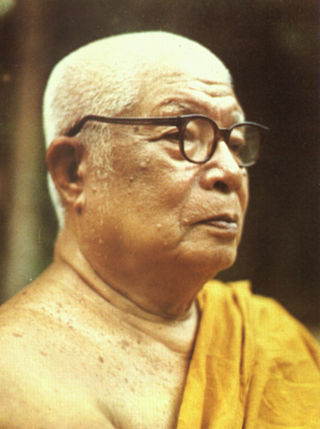
Buddhadasa was a Thai Buddhist monk. Known as an innovative reinterpreter of Buddhist doctrine and Thai folk beliefs, he fostered a reformation in conventional religious perceptions in his home country, Thailand, as well as abroad. He developed a personal view that those who have penetrated the essential nature of religions consider "all religions to be inwardly the same", while those who have the highest understanding of dhamma feel "there is no religion".
The Vipassanā movement, also called the Insight Meditation Movement and American Vipassana movement, refers to a branch of modern Burmese Theravāda Buddhism that promotes "bare insight" (sukha-Vipassana) to attain stream entry and preserve the Buddhist teachings, which gained widespread popularity since the 1950s, and to its western derivatives which have been popularised since the 1970s, giving rise to the more dhyana-oriented mindfulness movement.

Buddhism in Thailand is largely of the Theravada school, which is followed by roughly 93.4 percent of the population. Thailand has the second largest Buddhist population in the world, after China, with approximately 64 million Buddhists. Buddhism in Thailand has also become integrated with folk religion (Bon), Hinduism from millennia of Indian influence, and Chinese religions from the large Thai Chinese population. Buddhist temples in Thailand are characterized by tall golden stupas, and the Buddhist architecture of Thailand is similar to that in other Southeast Asian countries, particularly Cambodia and Laos, with which Thailand shares cultural and historical heritages. Thai Buddhism also shares many similarities with Sri Lankan Buddhism. Thailand, Cambodia, Myanmar, Sri Lanka and Laos are countries with Theravada Buddhist majorities.

The Kammaṭṭhāna Forest Tradition of Thailand, commonly known in the West as the Thai Forest Tradition, is a lineage of Theravada Buddhist monasticism.
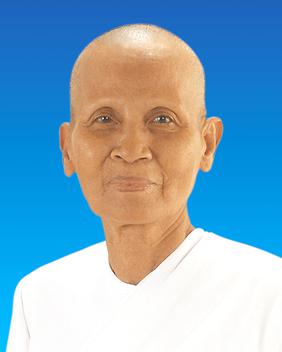
Chandra Khonnokyoong was a Thai Maechi (nun) who founded Wat Phra Dhammakaya. Religious studies scholar Rachelle Scott has described her as "the most influential female meditation teacher in Thailand". Her own students call her Khun Yay Achan Mahā-ratana Upasika Chandra Khonnokyoong, an honorific name meaning "grandmother-master-great-gem devotee". Although illiterate, she was widely respected for her experience in meditation, which is rare for a maechi. She managed to attract many well-educated students, despite her rural background and illiteracy. Some scholars have raised the example of Maechi Chandra to indicate that the position of women in Thai Buddhism may be more complex than was previously thought.
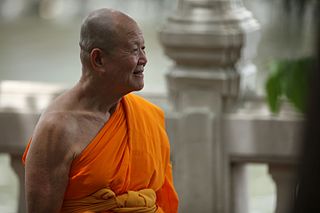
Luang Por Dattajivo, also known by his birth name Phadet Phongsawat and former ecclesiastical title Phrarajbhavanajahn, is a Thai Buddhist monk. He is the former deputy-abbot of Wat Phra Dhammakaya and the vice-president of the Dhammakaya Foundation, and was the observing abbot of the temple from 1999 until 2006, and again from 2011 until 2016. As of December 2016, he was still widely considered the de facto abbot. He met Mae chi (nun) Chandra Khonnokyoong and Luang Por Dhammajayo in his student years, and they have been his teachers throughout his life.

P. A. Payutto, also known by his current monastic title, Somdet Phra Buddhaghosacariya, is a well-known Thai Buddhist monk, an intellectual, and a prolific writer.

Dhammananda Bhikkhuni, born Chatsumarn Kabilsingh or Chatsumarn Kabilsingh Shatsena, is a Thai bhikkhuni. On 28 February 2003, Kabilsingh received full monastic ordination as a bhikkhuni of the Theravada tradition in Sri Lanka. She is Abbess of Songdhammakalyani Monastery, the only temple in Thailand where there are bhikkhunis.

Kathoey or katoey is an identity used by some people in Cambodia, Laos and Thailand, whose identities in English may be best described as transgender women in some cases, or effeminate gay men in other cases. These people are not traditionally transgender, however are seen as a third sex, being one body containing two souls. Transgender women in Thailand mostly use terms other than kathoey when referring to themselves, such as phuying. A significant number of Thai people perceive kathoey as belonging to a separate sex, including some transgender women themselves.
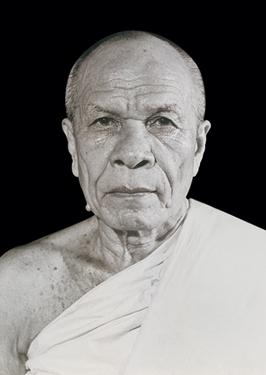
Luang Pu Sodh Candasaro, also known as Phramongkolthepmuni, was a Thai Buddhist monk who served as the abbot of Wat Paknam Bhasicharoen from 1916 until his death in 1959. He founded the Thai Dhammakāya school in the early 20th century. As the former abbot of Wat Paknam Bhasicharoen, he is often called Luang Pu Wat Paknam, meaning 'the Venerable Father of Wat Paknam'. He became a well-known meditation master during the interbellum and the Second World War, and played a significant role in developing Thai Buddhism during that period. He is considered by the Dhammakaya tradition to have rediscovered Vijja Dhammakaya, a meditation method believed to have been used by the Buddha himself. Since the 2000s, some scholars have pointed out that Luang Pu Sodh also played an important role in introducing Theravāda Buddhism in the West, a point previously overlooked.
In Thailand, one can find several different gender roles, identities and diverse visual markers of masculinity and femininity. Beyond the traditional male and female roles, there are categories for individuals who are gender non-conforming, whether in looks or behavior. These are generally regarded as sub-types of each sex, rather than a distinct gender identity, and correlate strongly with homosexuality. Demand and support for positive self-identity is growing in Thailand.
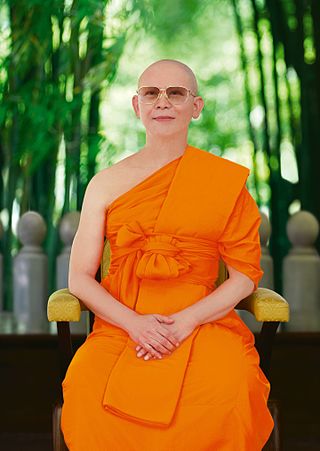
Luang Por Dhammajayo, also known by the lay name Chaiyabun Suddhipol, is a Thai Buddhist monk. He was the abbot of the Buddhist temple Wat Phra Dhammakaya, the post he held until 1999 and again from 2006 to December 2011. In December 2016, he was given the post of honorary abbot of the temple. He is a student of the nun (maechi) Chandra Khonnokyoong, and is the most well-known teacher of Dhammakaya meditation. He has been subject to criticism and government response. However, he continues to be a spiritual leader that has significant influence in Thai society. Luang Por Dhammajayo's approach to Buddhism seeks to combine the ascetic and meditative life with modern personal ethics and social prosperity.
Robert Evans Buswell Jr. is an American academic, author and scholar of Korean Buddhism and Chinese Buddhism as well as Korean religions in general. He is Distinguished Professor of Buddhist Studies at the University of California, Los Angeles and founding director of the Academy of Buddhist Studies at Dongguk University, Korea's main Buddhist university.
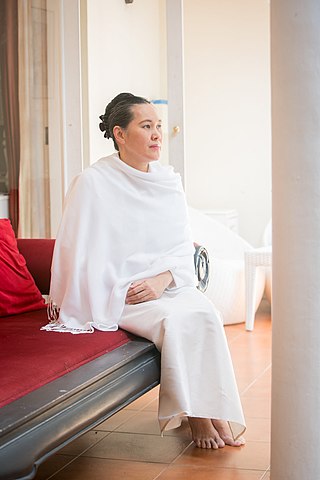
Acharavadee Wongsakon is a Thai lay Buddhist teacher and former entrepreneur who teaches a form of Vipassana meditation called Techo Vipassana Meditation. She is the founder of the Knowing Buddha Organization, which campaigns against disrespectful uses of Buddha imagery and the general decline of morality in society. Acharvadee and the Knowing Buddha Foundation have been endorsed by the National Office of Buddhism.

Barend Jan (Baas) Terwiel is a Dutch-Australian anthropologist, historian and Thai studies scholar. He has written books on ethnology of Tai peoples and Ahom, the history and culture of Thailand as well as historical travel of Europeans to mainland Southeast Asia. He retired in 2007, although he still writes about Thailand, releasing a new edition of his book Thailand's Political History in 2010. He authored 11 articles over 47 years from 1972 to 2019 for Journal of the Siam Society.
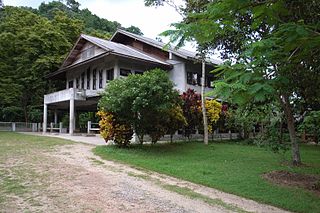
Suan Mokkhaphalaram, known as Suan Mokkh for short, is a Theravada-Buddhism monastery, retreat and meditation center in Amphoe Chaiya, Surat Thani, Thailand. It was founded in 1932 by the well-known monk, religious and social reformer Buddhadasa Bhikkhu, who was a representative and pioneer of Engaged Buddhism.














